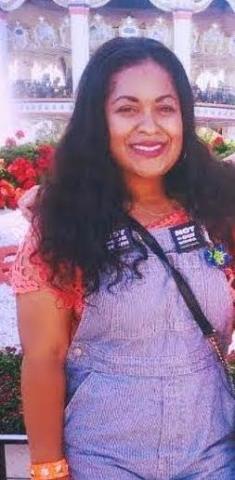By Ilana Fonariov
 "I really wanted to see a change in my school site where there was a lot of bullying and name-calling happening. Issues included low self-esteem, teasing, and girls getting mocked for dressing like tomboys," said Jasmine Frye, the student support specialist for an after-school program at an east Oakland elementary school, located in a low-income Latino community. She came to the school by-way of Bay Area Community Resources and Americorp, right after completing her sociology degree at UC Davis.
"I really wanted to see a change in my school site where there was a lot of bullying and name-calling happening. Issues included low self-esteem, teasing, and girls getting mocked for dressing like tomboys," said Jasmine Frye, the student support specialist for an after-school program at an east Oakland elementary school, located in a low-income Latino community. She came to the school by-way of Bay Area Community Resources and Americorp, right after completing her sociology degree at UC Davis.
Her school is located in an area with high rates of violence and crime in an underserved community where liquor stores outnumber the grocery stores. The school is the main resource site for children of the area.“I've seen a lot of kids who've seen someone shot in front of them, seen a lot of negative things and that definitely impacted their lives and the way they address things,” she said.
Additionally, the Oakland Unified School District (OUSD) has been dealing with a budget crisis for years. This program cut-backs make it hard for educators to adequately provide for children, lacking the resources and funding that other schools have. So despite the passion and dedication Jasmine ascribed to the school’s principal and teachers, Jasmine felt the students hungered for a more institutional support.
One of the biggest problem facing the school kids is fighting. It happens daily at her school, and it is not uncommon for verbal conflicts to escalate into physical violence. Jasmine felt the school needed a more focused effort to end bullying, teasing, and fighting.
That’s why Jasmine decided to contact Becki Cohn-Vargas, director of Not In Our School, to help prevent bullying behavior. That was two years ago. Now, her school has successfully elected anti-bullying student leaders, incorporated inclusivity lesson plans into the classrooms, and even hosted an all-school assembly featuring a motorcycle club.
Jasmine used materials from the NIOS website, such as curriculum ideas, lesson plans, and videos. Not In Our School activities helped Jasmine create a space that opened up conversations about violence, bullying and leadership and facilitated inclusivity with both students and staff. It also helped her establish weekly NIOS student activities in a consistent curriculum that helped the children who were struggling the most, both academically and emotionally.
While some bullying continued, it happened less often. As the year progressed, Jasmine noted incremental changes.
"Kids were actually doing their homework,” she said. “They became more positive, not only with themselves, but with their peers. We saw them taking more leadership roles–the upper grades, fourth and fifth graders, were being more nurturing to the lower grades, which is always great."
She also saw changes within herself, both professionally and personally. She noticed her own self-esteem increase. Perhaps most importantly, working with NIOS helped Jasmine realize her passion for working with children to create inclusive spaces that generate a sense of equality and community.
When addressing the larger issue of violence in the community, at first Jasmine was without a solution. As she shook her head in uncertainty, she suddenly paused and exclaimed her answer.
“I wish that Oakland had a Not In Our Town initiative for the whole town to adopt!”
So maybe that’s what we need. We need a more systemic, community-wide approach. Or maybe that’s wrong, too limited, too. Maybe we need a diversity of tactics. We need schools to start anti-bullying and anti-hate campaigns and we need towns and cities to start municipal-wide campaigns. We need policy changes and we need individual changes. We need to be a team. And we need to be courageous, like Jasmine, who came into her school and just started something.
You can do something great too, and if you need support, you too can reach out to NIOS. We have resources and we have a network. Check out notinourschool.org and learn how to start a campaign.
Ilana is a social worker in the making, an activist, a writer and an aspiring homesteader. She’s co-produced and filmed a 16 mm semi-surrealist documentary about the Tar Sands and has written about food justice and food forests for the Watershed Sentinel. When she’s not blogging, milking goats and shoveling compost she studies anti-oppression, decolonization and group counseling.
Add new comment